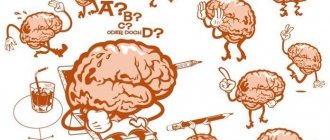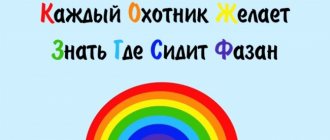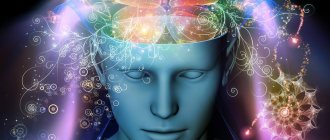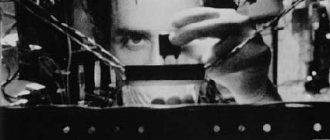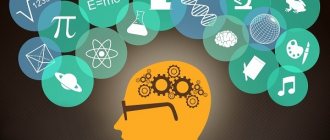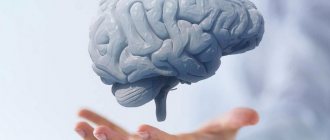Thinking, attention, memory, speech are closely related to the functioning of the brain. However, as a person ages, its cells tend to die, and neural connections are destroyed due to various factors. With age, a baggage of injuries, illnesses, and emotional turmoil accumulates - all this contributes to the deterioration of mental cognitive processes.
This would be very sad if not for one “but”. All of them are amenable to training, which slows down the aging process, strengthens neural connections, and reduces the risk of complications after all kinds of traumatic circumstances. And you can improve them at any age. The development of memory in adults is especially important, since it is she who begins to fail first. Alarm signals can make themselves felt by the age of 35, and if there have been injuries, much earlier. The main thing is to understand what needs to be done and practice regularly to achieve results.
Peculiarities
Many people believe that there is no need for an adult to develop memory, because the foundations were laid in childhood and if the child has not been worked on, nothing can be corrected. This may partially relate to speech or thinking, but not the ability to remember and reproduce information. It can and even needs to be trained throughout life.
In young age
From 20 to 30 years of age, memory deteriorates most often due to traumatic brain injuries, past infections, unhealthy lifestyle, and traumatic factors. Alcohol abuse, chronic lack of sleep, problems in relationships and at work - all this negatively affects the functioning of the brain. To correct the situation, first of all you need to put your life in order. And then select the appropriate simulators and sets of exercises. As a rule, at this age everything is still not so advanced, and you can safely practice at home for 5-10 minutes a day.
In middle age
From 30 to 40 years old, adults begin to develop memory, most often for the purpose of self-improvement, in order to remember more and better layers of information necessary for successful advancement at work. This perfectly helps to cope with all assigned responsibilities and at the same time increases IQ, since such techniques also work to improve thought processes. For this age, we can recommend modern mnemonics like “Giordano” that are quite difficult to master.
Serious problems begin between 40 and 50 years of age. Hormonal changes occur in the body, aging processes begin, metabolism slows down, which does not have the best effect on the functioning of the brain. It's time to start developing your abilities, or every year the deterioration will only progress: the failures will become deeper and more protracted. You need to devote at least 15 minutes to this every day.
In old age
If adults were engaged in memory development in a timely manner and managed to achieve certain success in this field by the age of 50, they will feel how useful it was. Firstly, much fewer problems are found than in those who have never heard of mnemonics and neurobics. Secondly, it is an excellent prevention of senile sclerosis and marasmus, Alzheimer's and Parkinson's diseases.
If you do the exercises regularly (=daily), even after 60 you can go to the store without a grocery list and calmly dial your son or daughter’s phone number from memory. The more time you devote to this in old age, the more effective the methods used will work. But it is better to consult a doctor about their choice.
5 life hacks for training memory and attention
These are not so much ways of training as options for organizing everyday life and free time, as well as changes in lifestyle. They will help optimize self-development, find 30-40 minutes for it in a busy schedule, and also saturate the brain with useful information and nutrients, by the way. TOP 5 life hacks for training memory and attention:
- Developing working memory - verbalize what you are doing.
- Eliminate anxiety - go to a psychologist and overcome anxiety, stress and panic attacks that impair memory.
- Organize your life correctly - use a notebook, always put things in the same place, take notes on lectures, use stickers.
- Install educational mobile applications - the most popular include “Peak”, “Brain Training”, “Lumosity”, “Elevate” and “1001 tasks for mental arithmetic”.
- Play sports - physical activity always helps develop the intelligence and abilities of your brain.
Don’t forget about the need to create optimal conditions for brain function - get enough sleep and eat right. Include fish, avocados, walnuts and lean meats in your diet more often. Exercise your brain regularly and manage stress. If possible, give up bad habits, especially psychotropic drugs, alcohol and cigarettes.
Techniques
It is important for adults to choose the right method for memory development. If there are specific programs for children (most often gaming), then after school a person is left alone with his problems. Some people prefer to ignore them: they forgot about an appointment - who doesn’t! Some people are hesitant to see a psychotherapist or neurobiologist: it’s embarrassing to admit that you can’t remember your own phone number. Others try to follow in the footsteps of childhood memories and play online simulators for preschoolers and teenagers, since they themselves cannot find anything more worthwhile.
All three situations turn out to be failures. As a result, memory will invariably deteriorate and every year more and more. Therefore, all adults need to know what methods for its development have been created for people who are already over... And in fact there are not so few of them:
- mnemonics;
- neurobics;
- finger gymnastics;
- speech exercises;
- speed reading;
- online simulators;
- test and game tasks;
- ordinary memory development exercises;
- mobile applications.
In addition to these effective techniques, you can use the miracle remedies of traditional medicine and innovative modern technologies. Dietary supplements, vitamin complexes, tablets that improve brain function and strengthen cognitive mental processes, coupled with the above methods, will allow you to remember and reproduce gigabytes of useful information. And, of course, do not forget that all this will have no effect if you do not normalize your lifestyle and monitor your health.
Exercises for memory development in preschoolers
The brain needs to be trained at a very young age. When a child assembles a pyramid of rings, having repeated the construction of this structure several times, he will soon remember that first he must put the largest donut on the pin, then smaller ones, and the smallest ones on top. A cone or asterisk is installed on the top.
Learning short rhymes, like:
“A clubfooted bear is walking through the forest,
He collects pine cones and sings a song.
Suddenly a cone fell, right on the bear’s forehead,
the bear got angry and kicked: stomp!
It's very fun to imitate the gait of a bear, hit yourself on the forehead and stamp your foot in the right place. These simple manipulations add visual and motor memory to auditory memory.
Fairy tales with frequent repetitions: “A mouse for a cat, a cat for a bug, a bug for a granddaughter, a granddaughter for a grandmother, a grandmother for a grandfather, a grandfather for a turnip,” develop auditory and visual memory, if you look at a colorful book with pictures.
Compiling pictures from puzzles develops attention to detail and visual memory. The child constantly has to compare a piece of the drawing with the general image.
Intellectual activities
Since the hippocampus, a part of the brain, is responsible for memory, most techniques are designed for its development. In an adult, it is already fully formed, but, nevertheless, in order to preserve and strengthen the neural connections between it and the rest of the nervous system, training is necessary. You can be sure that attention, speech, and intelligence will also improve along the way, because exercises and techniques will have a positive effect on the entire cerebral cortex.
Games
On the one hand, gaming activities are addressed primarily to children. However, in some cases it can develop memory in an adult if:
- he is new to this matter and has never worked on memory development before - it’s better to start with something simple;
- he experienced a severe injury (traumatic brain, mental), which led to problems with memory - its development and restoration must be dealt with gradually;
- The games are quite complex and not every adult can cope with them.
We offer an overview of several games that can be safely used by adults to develop cognitive processes.
Tag
A game familiar to many since childhood, which should not be ignored as an adult. To put each number in its place, having only one empty square at your disposal, you have to strain both your thinking (reason logically) and memory (memorize various combinations) in order to accurately calculate the moves.
Chess, backgammon, checkers
Few people know that chess is one of the most effective ways to prevent and treat Alzheimer's disease, the main symptom of which is memory impairment. The principle of its development is the same as in the previous game: you need to remember as many combinations of moves as possible in order not to make mistakes and win against your opponent.
Cards
Poker, preference and even the simplest solitaire games, which everyone has played on the computer at least once, are considered not the most positive (but typical for adults) and even gambling. However, experienced gamblers always have an excellent memory, a sharp mind and quick ingenuity, because here you also need to remember combinations and moves (your own and your opponent’s) in order to win.
Crosswords
Adults love to solve crossword puzzles. If you easily “destroy” a book of scanwords in a day and think that this is quite enough for the development of memory and thinking, you are mistaken. All the words are probably already imprinted in your head, and no training is taking place. You are marking time in one place. Try to find and solve other types of crosswords: anagram, associative, bilingual (in two languages), keyword (with numbers), scattered (reminiscent of puzzles), cyclocross (there are not only verticals and diagonals, but also arcs and circles), criss -cross (vice versa) and others.
Rebuses
It turns out that they are not only for children, but also for adults. Look for puzzles in which entire phrases are encrypted - proverbs, sayings and simply interesting facts. Some will require you to rack your brains for hours. The development of memory occurs due to the fact that one must constantly remember the order of letters in the alphabet, numbers, notes and other patterns. For example, try to read what is encrypted in this picture:
Answer: If you are suddenly bitten by a crocodile, then you just need to press hard on its eyes, and it will let you go (scientific fact from the life of animals).
Online games for the development of cognitive processes:
- Way of the Ninja;
- Numismatist;
- Astrologer;
- Soundvar;
- Vertical shift;
- Pyramidostroy, etc.
Download for your health and develop!
Memory exercises
If you are more serious and don’t want to play at all, select special exercises for developing memory and attention in adults and do them for 10-15 minutes a day. This will be enough to solve the most serious problems: from minor failures to amnesia. We present one of the complexes to your attention.
"Detective"
Someone at home lays out 15-20 different items in front of you. You study them closely for 30 seconds and turn away. An assistant removes 1 or 2 items behind your back. You need to guess what disappeared.
"Mnemonic storage"
Try to remember 15 writers of the 19th century, tropical fruits, mathematical formulas, famous scientists, works of L.N. Tolstoy, phone numbers of your family and friends, etc. Didn’t make it to 15? Look for the missing fragments, memorize and play again until they all fill your “Mnemonic Storage”.
"Vocabulary dictation"
The assistant writes words on a piece of paper that are in no way related to each other (run, stand, vacation, beautiful, alarm clock, etc.) and numbers them (from 15 to 20). You study them for 1 minute, then the list is removed from your sight and you reproduce it in writing in the same sequence.
"Let's get acquainted!"
Do you put off studying because of a busy work schedule and eternal time pressure? Then this exercise is just for you! It can be done on the way home or during your lunch break. Choose an object to observe - it should be a person you don’t know, who is not in motion (sitting or standing). Study it for 1 minute. Then turn away and try to remember in every detail what he looks like. Details such as eye color, moles, wristwatches, jewelry, buttons, pockets, etc. will matter.
"Cellular toking"
An easy exercise - but only at first glance. In the presence of someone (this is a prerequisite), begin to quickly and without pauses name out loud everything you see around. Record how long you were able to go without stopping. Rarely does anyone reach 4 minutes. Embarrassment (shyness) in front of the viewer, fatigue of the articulatory apparatus and brain cells are triggered. The more often you give them such loads, the longer you can hold out.
"Writer"
It is somewhat reminiscent of the “Vocabulary Dictation” exercise. The assistant gives you 10-12 words that are in no way related to each other, you remember them and compose a story based on them. It could be a fairy tale, a poem or any literary work. The main thing is that absolutely all words are mentioned in it.
Aivazovsky exercise
Included in almost all sets of mnemonics exercises for any age, including adults. Improves photographic memory. You need to choose to observe a complex picture with a lot of details (for example, S. Rosen’s “Still Life with Fruit and Sunset Landscape” or P. Bruegel’s “Mad Greta”). Study it for 1.5 minutes. Then close your eyes or turn away and try to reproduce its smallest details.
Painting by P. Bruegel “Mad Greta”
Neurobics
As you already understand, in order to develop memory and thinking, you need to constantly train your brain. This strengthens neural connections and improves the functioning of the hippocampus. Neurobics—gymnastics (exercises) for the mind—will help you do this quickly and efficiently. At first glance, it may seem that it has absolutely nothing to do with the processes of memorizing and reproducing information, but after a couple of weeks of training you will feel how its volume has increased.
- Try to visit new places.
- Use different essential oils, scented soaps, perfumes, deodorants, air fresheners.
- Do normal tasks with your eyes closed (for example, vacuuming or taking a shower).
- Change hands: sometimes do with your left hand what you usually do with your right and vice versa.
- Master new types of activities, get several educations.
- Look for multiple answers to the same question.
- Once a day, read an unfamiliar text on a topic far from your area of interest, and try to understand it.
- Turn off the TV sound. Guess what we are talking about.
- Are you used to doing everything quickly? Slow down the pace by half. Or vice versa.
The main task of neurobics is to create a new environment for the senses. This will force the brain to turn on previously unused resources, including waking up the hippocampus, which is responsible for memory development.
Finger gymnastics
Finger exercises help improve memory in adults by developing the hemispheres of the brain and creating new neural connections in the brain. This speeds up thought processes and increases the amount of information remembered. Be prepared for the fact that not everything will work out the first time. Train and the results will be obvious.
- Show a thumbs up with one hand, like/quickly change hands with the other.
- Place the fist of the other on top of the outstretched palm of one hand / quickly change hands.
- Sit at the table, methodically knock on it with the fist of one hand, and stroke its surface with a circular motion with the outstretched palm of the other hand / quickly change hands.
In yoga there are a large number of exercises specifically for finger gymnastics, and each will work on memory development. The main thing is to practice every day and constantly complicate the tasks.
Speech exercise
Speech is most directly related to memory and thinking. If one thing gets worse, it leads to problems with other processes. Therefore, all these components need to be developed. Tongue twisters handle this best. Moreover, children's ones are not suitable. Take something more difficult. First, you need to remember word for word. Secondly, pronounce quickly - this is how not only diction and articulation apparatus develop, but also memory. Which ones can you take:
- The longboat arrived at the port of Madras. The sailor brought a mattress on board. In the port of Madras, a sailor's mattress was torn apart in a fight by albatrosses.
- You even stained your neck, even your ears with black mascara. Get in the shower quickly. Rinse the mascara off your ears in the shower. Rinse off the mascara from your neck in the shower. After your shower, dry yourself off. Dry your neck, dry your ears, and don’t dirty your ears anymore.
- The Staffordshire Terrier is zealous, and the black-haired Giant Schnauzer is playful.
- The snake was bitten by the snake. I can't get along with the snake. I’ve already become narrower from horror - the snake will eat it for dinner.
- In the hut, a yellow dervish from Algeria rustles his silks and, juggling with knives, eats a piece of fig.
Mnemonics
One of the most effective techniques for memory development. Based primarily on associations, but also uses other techniques. If adults were not lucky enough to learn short poems during schooling in childhood to remember some patterns (sequence of planets in the solar system, colors of the rainbow / exceptions to the rules / mathematical formulas and long decimal fractions like Pi), now is the time to start. This will significantly improve memory and increase its capacity.
Training systems using this method, for all ages, can be found in our separate article.
Tests
On the Internet you can find many online simulators that offer tests to determine the level and volume of memory. The more often you visit such resources and the more varied the tasks you choose, the faster the development of cognitive processes will occur. Their implementation requires increased concentration, ingenuity, and the ability to remember a lot of information.
Recommended online trainers: Vikium, Sepika, Bitreynika, Superbrain, BrainApps, Zanimatika.
Example types of tasks:
- Among a dozen similar objects, find one that is different.
- Fill in the blanks in an example or equation.
- Find a certain number of differences in the illustrations.
- Remember numbers or words that appear on the screen for a moment.
- Orally count a difficult example.
One test a day for adults - and there will be no problems with memorization.
Tasks
There are tasks for logical thinking and intelligence that require both concentration and the ability to remember details and a large amount of information. Such puzzles are especially good for developing memory in adults.
Example:
In the football championship, where each team fought each other once, 4 teams participated: “Alpha”, “Beta”, “Omega” and “Gamma”. For a loss, the team was awarded 0 points, for a win - 2 and for a draw - 1. The final match ended: Alpha lost to Omega, but still became winners, and Omega did not improve their team's score. How did “Omega” and “Gamma” play with each other?
Answer:
There were 6 games in total, which means 12 points. Alpha has no more than 4 points because the final game is won. But a team cannot have 3 points, because then other teams have no more than 2 points (“Alpha” is in 1st place), so all groups have no more than 9 points. It turns out that “Alpha” has 4 points and they defeated “Beta” and “Gamma”. Until the final game, Omega could not have 2 or 1 point. Otherwise, if they had defeated Alpha, they would have moved up a place. Therefore, Omega lost the other 2 games and therefore scored only 2 points. Consequently, “Beta” and “Gamma” defeated “Omega” and played a draw among themselves.
Memory Strengthening Products
Diet can help your brain function properly. The most useful foods for memory are those enriched with vitamins A, B6, B9, B12, D, E, Omega-3.
Experts recommend eating more fruits, fresh vegetables and whole grain flour products. It is also useful to add turmeric to food, because this spice helps maintain memory and prevent Alzheimer's disease, which is especially important for an elderly person.
Here are the top 10 most useful foods for improving memory:
- Sea fish. It is one of the best sources of Omega-3 fatty acids. Regular consumption of tuna, salmon and other fatty sea fish will help maintain mental clarity into old age.
- Eggs. Easily digestible and essential protein for brain function. In addition, egg yolk contains choline, which is very beneficial for memory.
- Nuts and whole grains. All nuts contain vitamin E, which protects brain cells from destruction. And whole grains are an excellent source of carbohydrates and B vitamins.
- Oatmeal. Oatmeal is healthy for both children and adults. It not only improves brain function, but also has a beneficial effect on the entire body.
- Berries. Blueberries, strawberries, blackberries and currants are especially useful. Darker colored berries have more nutrients.
- Beans . These are sources of valuable minerals, fiber, complex carbohydrates and large amounts of protein.
- Fish fat. It is prized for its unique ratio of omega-3 fatty acids. Researchers have found that if you regularly drink fish oil, you can significantly improve your memory.
- Dairy food. It brings particular benefits to children due to the content of protein and B vitamins. But vitamin D, which dairy products are also rich in, is vital for people of any age. Scientists have found that a drop in the level of this vitamin below 20 nanograms per 1 ml of blood leads to more rapid memory deterioration.
- Meat. Beef, lamb and other red meats are rich in iron and zinc. These elements keep your memory in good shape. Poultry meat without skin is also useful.
- Foods rich in the right fats. Our entire nervous system and brain are 80% fat. Sources of good fats are young cheese, avocado, olives, melted butter, and egg yolk.
Here are the foods that can harm brain health and memory:
- alcohol;
- sugar;
- refined carbohydrates - noodles, rice, fast food, sugary cereals.
When talking about proper nutrition, one cannot fail to mention excess weight. Researchers have found that obesity has a detrimental effect on memory and overall health.
Facilities
If intellectual puzzles and logical problems do not help, then a specialist should deal with it.
Medications
If there are serious problems with memory and the doctor has diagnosed this, he may suggest solving them with pills. There are a number of drugs that improve cerebral circulation and promote the development of thinking and memory. The most famous: Noopept, Nootropil, Glycine, Phenibut, Piracetam, Tenoten and other nootropics, adaptogens, antioxidants, antidepressants.
Sometimes they can prescribe individual vitamins that help improve and develop memory: C, D, E, almost the entire group B. They are also collected in multivitamin complexes designed specifically for the brain.
Adults can take a course of dietary supplements, but no one can guarantee their effectiveness. Although good drugs for the development of cognitive processes are produced by Doppelherz (Germany), Evalar (Russia), Solgar (USA).
Folk remedies
The same goes for folk remedies. They don't develop memory. But by activating cerebral circulation, normalizing blood pressure and improving overall well-being, they help adults begin to remember and reproduce much larger volumes of information faster and better (without errors ) . Infusions and decoctions of meadow clover flowers, motherwort leaves, wormwood, elecampane roots, red rowan bark, and rose hips have such properties.
However, you should be extremely careful with folk remedies, since in the presence of chronic diseases they can cause their exacerbation or side effects.
Exercises to develop visual memory
Drawing irregular patterns, solving puzzles and puzzles, dividing a complex picture into simple parts are wonderful exercises for developing visual memory.
The Chinese, in order to quickly remember the spelling of a hieroglyph, divide it into several parts. It is easier to remember individual parts. Mentally putting them together, you get the overall picture. So it’s easier to remember a stranger’s appearance if you remember the color of his jacket, shirt, jeans and shoes.
Visual memories become stronger if they are complemented by color, smell, and the melody that sounded at that moment. Remembering a beautiful pear, you will involuntarily feel its taste.
Comparing pictures that are slightly different from each other trains attention to detail and strengthens visual images.
Recommendations
Experts also provide useful advice to adults who are planning memory development.
- Try to strain your brain as soon as possible. Learn a new foreign language, take a driving course, etc.
- Watch intellectual films, visit unusual art exhibitions.
- Meet people more often, communicate more, make connections - do networking.
- Read more, give preference to the classics.
- Learn to manage your emotions, don’t let empty worries and nervousness get the better of you.
- Use the well-known ways to improve cerebral circulation: enjoy fresh air as much as possible, play sports, and learn breathing exercises.
If you want all the methods described above to work, try to follow these recommendations.
Is it possible to improve brain function?
American neuroscientist and psychologist Richard Davidson studied meditation as a healing practice and studied how emotions affect brain activity. In co-authorship with journalist Sharon Begley, he wrote the book “How Emotions Rule the Brain,” forming and proving the theory that a person is able to independently regulate the functioning of brain structures. His technique helps in solving important problems:
- Personal self-development.
- Treatment of mental disorders - dysthymia, psychopathy, depression.
- Brain training to improve memory, alertness and concentration.
- Social adaptation.
In the course of many years of research, R. Davidson found that many mental disorders have an identical development mechanism, which correlates with the lack of connection between emotions and intelligence. The brain does not evaluate external and internal influences and does not determine their degree of significance for the individual. As a result, in response to the influence, emotional behavioral programs that are adequate to the situation are not formed.
An individual reacts to a stimulus in accordance with a stereotype once recorded in the subconscious. Inappropriate behavior is a consequence of a violation of internal relationships. Mental health involves a balance of processes regulated by the central nervous system. The development of emotional intelligence is a promising technique that helps to achieve harmony between emotional manifestations and cognitive processes. Main theses of the theory:
- By training your brain, you can force it to change.
- The changes that occur in consciousness can be measured.
- Effective ways of thinking will change your life for the better.
According to the neuroscientist, well-being is a skill that can be developed. This means that theoretically every person can become self-sufficient and happy. The most important discovery of modern scientists is confidence in the unlimited capabilities of the brain. This organ does not stop developing if the individual constantly trains intellectual skills.
By exercising your brain for 30 minutes daily, you can achieve noticeable results within 2 weeks. Techniques for improving memory and concentration are based on stimulating brain structures to perform certain work. By forcing them to function intensively, you can increase the efficiency of mental activity.
Books
- Bukin D. Development of memory according to the methods of special services.
- Buzan T. Improve your memory.
- Dumchev A. Remember everything. A practical guide to memory development.
- Kawashima R. Train your brain. Japanese system for the development of intelligence and memory.
- Katz L. Don't let your brains dry out. 83 neurobics exercises.
- Loberg K., Beister M. Fast mind. How to forget what is unnecessary and remember what is necessary.
- Muller S. Remember everything: secrets of supermemory. Book-simulator.
- Pugach Yu. K. Development of memory. System of techniques + 126 exercises for memory development.
- Sipe R. Brain development. How to read faster, remember better, and achieve bigger goals.
- Foer J. Einstein walks on the moon. The science and art of memory.
Memory development needs to be addressed not only by children, but also by adults. All of the above methods will allow you to stop the aging processes that lead to its deterioration. They mitigate or completely eliminate the harmful effects of an unhealthy lifestyle, traumatic brain injuries, severe infectious diseases and other harmful factors that cause brain cells to die and neural connections to collapse. Just 10-15 minutes of daily training and all this can be minimized so that by the age of 40 you do not suffer from senile sclerosis.
A little theory: how our memory works
How to improve memory for studying? To answer this question, let's understand what memory is and how it works.
Thanks to modern research, we know for sure that memory does not have a clear location in the brain. It is rather a function of nerve cells that create connections among themselves when we learn new material or learn non-standard skills. Whether this connection will be strong or disintegrate over time depends on how persistently a person repeats information or trains a newly acquired skill.
Why do we forget so much? This is the brain's defense mechanism
What else do we know for sure about memory? That it comes in two types:
- short-term;
- long-term.
The first has a limited volume and cannot hold more than four to seven (depending on training) objects. The brain then processes the new information and transfers it to long-term memory, where it can be stored for years. But what will end up in this storage and settle there as dead weight, and what will be integrated into everyday life, the brain decides during the long sleep phase.
At a young age, we remember information very easily and quickly. And for adults, memory can sometimes fail. But this is not a reason to hang your nose and prepare for Alzheimer's. Brain neuroplasticity can be at a very high level at any age. The main thing to remember is that brain activity can and should be developed.
Eat less sugar
Excessive sugar consumption leads to Short-term exposure to a diet high in fat and sugar, or liquid sugar, selectively impairs hippocampal-dependent memory, with differential impacts on inflammation. to a variety of health problems, including cognitive decline. Research shows Sugar beverage intake and preclinical Alzheimer's disease in the community. That an unbalanced diet can cause memory impairment and a decrease in brain volume, especially in areas responsible for memory.
Reducing the amount of sugar in your diet will help avoid such problems and generally have a positive effect on your health.
Spend more time on complex information
Which information is remembered most easily at the beginning or at the end? Researchers have found that the order in which data is examined plays a significant role in how quickly the brain samples and produces that information. And the material is remembered best at the beginning of the book and at the end.
Information is often lost in the middle, but this problem can be solved by repeating it several times. Another strategy is to try to rephrase what you've learned in your own words to make it easier to remember.
Drink less alcohol
Alcohol has devastating effects on many aspects of health. Memory is no exception. Scientists have studied Binge drinking during adolescence and young adulthood is associated with deficits in verbal episodic memory. 155 college freshmen. Those who drank heavily performed worse on memory tests than students who never drank. Due to the neurotoxic effects of alcohol on the brain, heavy drinking can damage Hippocampus in health and disease: An overview. The hippocampus is the most important part of the brain for memory.
However, scientists believe that negative consequences can be easily avoided if you drink in moderation.
Visualize information
Visualizing information often helps people remember material better because some people are more visually inclined. Pay attention to photographs, graphs and tables in the same textbooks, for example. You can create your own diagrams, diagrams and drawings, use notes in the margins or colored markers in order to remember significant points and find what you need quickly.
Watch your weight
Obesity is a risk factor for cognitive decline. Excess weight can cause Obesity Weighs down Memory through a Mechanism Involving the Neuroepigenetic Dysregulation of Sirt1. changes in memory-related genes in the brain, negatively affecting memory.
As part of the experiment, scientists observed Higher body mass index is associated with episodic memory deficits in young adults. followed a group of people aged 18 to 35 and found that a higher body mass index was associated with poor performance on memory tests. Obesity also results from 37 years of body mass index and dementia: observations from the prospective population study of women in Gothenburg, Sweden. to a higher risk of developing Alzheimer's disease.
Find time to meditate
Meditation calms Meditation: Process and effects., reduces pain, lowers blood pressure and increases the amount of gray matter. With age, there is less of it in the brain. This is negative Gray matter network measures are associated with cognitive decline in mild cognitive impairment. affects memory and learning abilities.
Meditation improves The potential effects of meditation on age-related cognitive decline: a systematic review. short-term memory. This effect has been observed in people of all age groups. A study conducted at a Taiwanese college found that students who participated in meditation practices had significantly better spatial working memory than their classmates.
First signs of dementia
- Both long-term and short-term memory are impaired. It becomes difficult for a person to remember events that happened recently or remember new information.
- A person loses the skills of orientation in space and time. It is not uncommon for patients to become lost even in areas familiar to them.
- Indifference to once-loved activities appears, and the desire to learn new things disappears. This happens because the brain is no longer able to receive and process information.
- Reducing the criticality of one's own perception. Usually this symptom appears when planning the next period of life.
- In the future, both the progression of these symptoms and the appearance of others, more powerful in their effects, are noted. One of the clear hallmarks of dementia is that a person lives in his past.
At the earliest manifestations of the disease, it is important to promptly consult a therapist or general practitioner. If necessary, he will refer the patient to a specialist (neurologist, psychiatrist or geriatrician).
Eat less refined carbohydrates
Research shows that diets high in refined carbohydrates are linked Why is obesity such a problem in the 21st century? The intersection of palatable food, cues and reward pathways, stress, and cognition. with dementia and cognitive decline.
Scientists examined 317 children and identified Relationships between Dietary Intake and Cognitive Function in Healthy Korean Children and Adolescents. decreased cognitive performance in those who ate more processed carbohydrates, such as white rice, noodles and fast food. Another study found in the Prospective Study of Ready-to-Eat Breakfast Cereal Consumption and Cognitive Decline among Elderly Men and Women that adults who eat sugary cereals for breakfast every day perform worse on tests.
Engage your sense of smell
Have you been using the same perfume for years? It's time to change that! A good way to get your brain working is to rid it of the “aromatic” routine. The sense of smell is an important channel for the perception of reality. You also need to periodically add something unusual to it, be it new perfumes or spices when cooking.
Biohacking: is it possible to hack your body and gain eternal youth?
Analyze the material in detail and repeat what you have learned
To remember information, you must first make it understandable to the brain, and then repeat everything you learned again, then the information will definitely fall into long-term memory. For example, read the definition of a key term, study the definition of that term, and then read a more detailed description of what that term means. By repeating this process several times, you will probably notice that you recall the term more easily and quickly over time.
To repeat the studied material, it is also recommended to divide it into three difficulty categories. For each, select the amount of time you will spend and the days per week.
Review the material again, if you remember it well, then repeat it only once a week.
If you have difficulty reproducing information, then re-read it after a few hours or every other day.
And if you don't remember anything, then study the material again for 10 minutes. After everything, the cycle repeats, you again sort the information according to how you remembered it and allocate your time to repetition and filling in gaps.
Exercise
Physical exercise is known to improve cognitive abilities, concentration, blood circulation in the brain by increasing the flow of oxygen to brain cells, and mood.
Exercise also causes the release of the protein cathepsin B in the brain. This stimulates the growth of neurons (brain cells) and creates additional connections in the hippocampus, an area of the brain responsible for long-term memory and retention.
The effectiveness of exercise in improving brain function has been proven in a number of studies, so let's talk about that first. One study showed that just a few minutes of light exercise resulted in immediate memory improvements. Participants in the experiment performed exercises of varying intensity, and at this moment the scientists observed changes in brain activity.
The results showed that during these exercises, connectivity improved between the areas of the brain responsible for creating new episodic memories (autobiographical memory, which remembers “who, what, where and when”), as well as in the dentate gyrus and hippocampus.
Therefore, with just a few minutes or even an hour of exercise, you can improve your memory. You can try a treadmill or walking to start with, and most people can do it.
A few more tips
1.If you are right-handed, from time to time perform your usual rituals with your left hand. And vice versa. For example, use your other hand to brush your teeth or use this technique during breakfast or lunch.
2.Another useful exercise is to take a shower or perform other normal activities with your eyes closed.
3. When getting to work, the store and other places, change your route regularly.
4. Try watching films without sound from time to time, and try to understand what is being said by the actors’ gestures and movements.

